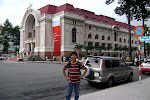
Last Monday, Fidel Alejandro Castro (born August 13, 1926) celebrated his 81st presence. He is probably one of the remaining “relics” of the Cold War who continues to worry his neighbors in North America.
I remember watching an old movie based on his life and revolution when he overthrew the government Fulgencio Batista in 1959. In that movie, I remember a young Castro leading a failed attack on a military camp (1953) and much later, a guerrilla invasion of Cuba (December 1956).
His name and face has always made a presence whenever there is a movie made on the Cuban Missile Crisis or on the JFK presidency.
While many outside Cuba and maybe, even within the country see Castro as a tyrant, there are still who see the charismatic leader in him.
At home, Fidel Castro has probably achieved more in areas of public health care and education than most modern countries in the world.
Cuba ranks better than many countries on the United Nations' List of countries by infant mortality rate, which is claimed by Castro's supporters as a success of his regime. Today, since July 31, 2006, Cuba is being led by his younger brother, Raul Castro.
While much has been written about his political life and views, let me scribble a few words about his relationship with the Church. Did you know he as was raised a Roman Catholic as a child but has renounced the Christian faith.
In 1962, he was excommunicated by Pope John XXIII on the basis of a 1949 decree by Pope Pius XII forbidding Catholics from supporting communist governments. During the 90s, Castro allowed to Catholics to join the Cuban Communist Party.

And by 1998, Pope John Paul II visited Cuba . This was the first visit by a reigning pontiff to the island. There are many images Castro and the Pope appeared side by side in public during the visit. During the Pontiff’s visit, the Pope said that true liberation "cannot be reduced to its social and political aspects," but must also include "the exercise of freedom of conscience — the basis and foundation of all other human rights." (Photo courtesy of Baltimore Sun)
The Pope also criticized widespread abortion in Cuban hospitals and urged Castro to end the government's monopoly on education to allow the return of Catholic schools. A month later Castro condemned the use of abortion as a form of birth control.
And by December 1998, Catholic Cubans were finally able to celebrate Christmas openly as Castro formally re-instated Christmas Day as the official celebration after it abolished it in 1969. The Pope sent a telegram to Castro thanking him for restoring Christmas as a public holiday.
 After the Pope's death in April 2005, an emotional Castro attended a mass in his honor in Havana's cathedral. "Rest in peace, tireless fighter for friendship among peoples, enemy of war and friend of the poor,” Castro wrote in the condolences book at the Vatican’s mission in Havana. Cuba had 3 days of mourning. Thousands visited the cathedral and followed the service led by Cardinal Jaime Ortega. (Photo of Castro reading the condolence book by Jorge Rey/AP)
After the Pope's death in April 2005, an emotional Castro attended a mass in his honor in Havana's cathedral. "Rest in peace, tireless fighter for friendship among peoples, enemy of war and friend of the poor,” Castro wrote in the condolences book at the Vatican’s mission in Havana. Cuba had 3 days of mourning. Thousands visited the cathedral and followed the service led by Cardinal Jaime Ortega. (Photo of Castro reading the condolence book by Jorge Rey/AP)It was during the wedding of one of his sisters, back in 1959, when Castro last visited this cathedral.
While media and public presence continues to decline but his historical and cultural presence will continue beyond many years. His presence would continue to be read in history books and felt in the streets of Cuba for many many years. Maybe, one day, Chief and I could visit Havana, before it is overtaken by commercialism.





No comments:
Post a Comment